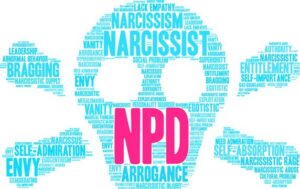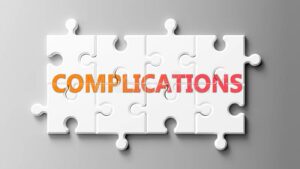A narcissistic personality disorder is one of the most talked-about mental health conditions in the world. But what is it, really? And how do you know if you or someone you know has it? In this blog post, we will discuss the signs and symptoms of narcissistic personality disorder. As well as how to get help if you think you or someone you know might be affected by it.
Contents
- 1 What Is Narcissistic Personality Disorder?
- 2 Signs Of Narcissistic Personality Disorder
- 3 Causes Of Narcissistic Personality Disorder
- 4 Is There Any Complications Of The Disorder?
- 5 Diagnosis Of Narcissistic Personality Disorder
- 6 Treatment For Narcissistic Personality Disorder
- 7 How To Deal With Narcissistic Personality Disorder?
- 8 Conclusion
- 9 A Word From Therapy Mantra
What Is Narcissistic Personality Disorder?
 A narcissistic personality disorder is a mental disorder. That is characterized by an inflated sense of self-importance. A need for excessive attention and admiration. And a lack of empathy for others. People with this disorder often display grandiose behaviors. And have a strong sense of entitlement.
A narcissistic personality disorder is a mental disorder. That is characterized by an inflated sense of self-importance. A need for excessive attention and admiration. And a lack of empathy for others. People with this disorder often display grandiose behaviors. And have a strong sense of entitlement.
The narcissistic disorder is a relatively rare mental illness. It is estimated to affect less than one percent of the population.
People with a narcissistic personality disorder often have difficulty maintaining relationships. They may be manipulative or domineering and can be emotionally abusive. They may also exhibit signs of entitlement and privilege. This can lead to problems at work or in school.
Signs Of Narcissistic Personality Disorder
There are various signs and symptoms of narcissistic personality disorder. It is important to be able to identify them. As it can help you get the necessary treatment and support.
Excessive self-importance
A person with the narcissistic disorder will have an inflated sense of self-importance. They will often talk about themselves in an exaggerated way. And will expect others to praise and admire them.
They may also belittle or look down on those around them. As they think they are better than everyone else. They give themselves excessive self-importance. Hardly care about others, and only want to be admired.
Grandiose fantasies
Another symptom of narcissistic personality disorder is having grandiose fantasies. A person with this condition will often daydream about success, power, wealth, or beauty. They want to be famous or important in some way. And believe that they are special or unique.
They may think that they can only be understood by other people who are also special or high-status. And that they should associate with other people who are like them. People with this disorder often have a sense of entitlement too. They feel that they deserve special treatment. And, they should get things they want, without doing anything to earn it themselves.
Need for Admiration
A person with a narcissistic personality disorder will need constant admiration from others. They may fish for compliments and become upset if they don’t receive them.
They may also become jealous easily and feel threatened by the success of others. Even people close to them. As they feel like they are losing their spotlight. They are always in need of admiration and appraisal.
Lack of empathy
These people often lack empathy. They can be insensitive to the feelings of others and don’t really understand them. They may not care about how their words or actions affect other people. And, will often disregard the thoughts and feelings of others. This is why it can be difficult for them to maintain healthy relationships.
Lack of empathy is one of the most common symptoms of narcissistic personality disorder. And, it is one of the things that sets them apart from other people.
Manipulative behavior
Narcissists are very good at manipulating people. They know how to get what they want by playing on someone’s emotions. And, will often use guilt trips or threats to do so.
They may also lie or make up stories in order to make themselves look better in front of others. A person with this disorder can manipulate others to a great extent. Even so, they do not have any fear of being caught. In fact, they may actually enjoy it.
If you or someone you know is exhibiting any of these signs and symptoms. It is important to seek help from a professional. As narcissistic personality disorder can be very damaging to both the individual and their relationships.
Causes Of Narcissistic Personality Disorder

As such there are many different causes for narcissistic personality disorder. Ranging from genetic factors to environmental ones. Below are some of the most common causes:
Genetic
It is believed that narcissistic personality disorder can be passed down from generation to generation. This is due to the fact that narcissism tends to run in families. Genetics plays a role in the development of this disorder. Through this cause, people are more likely to develop narcissistic personality disorder if one or both of their parents have the disorder.
Abusive Upbringing
If someone has been raised by an abusive parent or caregiver. They may be more likely to develop a narcissistic personality disorder. This is because abuse can cause people to feel insecure and unworthy. They may also learn that the only way to get what they want is to be manipulative and take advantage of others.
Environment
It is also believed that the environment can play a role in the development of narcissistic personality disorder. For example, if someone grows up in an environment where they are constantly praised and told they are special. They may develop narcissistic tendencies.
On the other hand, if someone grows up in an environment where they are constantly put down. Or made to feel a person worthless. Then, it also develops narcissistic personality disorder.
Trauma
If someone experiences a traumatic event, such as abuse or neglect. It can cause them to develop this disorder. Trauma can also lead to changes in the brain. That makes someone more susceptible to developing the disorder.
Narcissistic Personality Disorder can have a number of different causes. Ranging from genetics to environment. It is important to remember that if you think you may be suffering from this disorder. You should reach out to a professional for help.
Is There Any Complications Of The Disorder?
 As of now, there are no specific complications associated with a narcissistic personality disorder. However, like any other mental health disorder. It can lead to problems in relationships and work life, as well as difficulty coping with stress.
As of now, there are no specific complications associated with a narcissistic personality disorder. However, like any other mental health disorder. It can lead to problems in relationships and work life, as well as difficulty coping with stress.
There are some complications or risks associated with the disorder. Such as:
- More likely to engage in risky behaviors.
- Driving too fast or drinking alcohol in excess.
- Problems coping with stress.
- Being less able to regulate their emotions.
- Difficulty empathizing with others.
- Difficulty in seeing things from others’ perspectives.
- Increased risk of self-harm or suicide.
There is a risk of developing other mental health disorders. Such as depression and anxiety. Additionally, people with a narcissistic personality disorder may abuse alcohol or drugs.
Diagnosis Of Narcissistic Personality Disorder
Diagnosing narcissistic personality disorder can be difficult. Because the symptoms vary from person to person. The APA Diagnostic and Statistical Manual (DSM-V) provides a set of guidelines. In order to diagnose narcissistic personality disorder.
The diagnosis of this disorder includes a set of tests to identify. The test requires a questionnaire, an examination of the patient’s medical and family history. As well as a clinical interview. The goal of the diagnosis is to rule out other possible mental disorders.
Early diagnosis and treatment can make a big difference in managing the symptoms. If you or someone you know is displaying signs of narcissistic personality disorder. You must reach out to a mental health professional for help to get treatment on time.
Treatment For Narcissistic Personality Disorder
 Few people are aware of the fact that narcissistic personality disorder is a real mental disorder. Even fewer know that it is possible to treat this disorder effectively.
Few people are aware of the fact that narcissistic personality disorder is a real mental disorder. Even fewer know that it is possible to treat this disorder effectively.
The most important thing to understand is that narcissists believe they are better than everyone else. This sense of superiority is often based on an inflated sense of self-importance. And a deep need for attention and admiration. Narcissists also tend to be very sensitive to any criticism. Which can make them quick to angry.
Methods of Treatment:
- Psychotherapy – In this, the therapist will work with the narcissist to help them understand their disorder. And how it affects their lives and the lives of those around them.
- Cognitive Behavioral Therapy – This type of therapy helps people change the way they think about themselves and others. It can be very effective in helping narcissists learn to manage their symptoms.
- Medication – In some cases, medication may be prescribed to manage certain symptoms. For example, antidepressants may be prescribed for depression or anxiety disorders. That often occurs alongside the disorder.
- Support Groups – These available for family members and friends of narcissists. And, can provide valuable information and support.
There is no one-size-fits-all approach to treating the disorder. But with patience and commitment. It is possible to help a person with this condition. And, they can live healthier, happier life.
How To Deal With Narcissistic Personality Disorder?
Dealing with such as disorder can be difficult. But there are some things you can do in order to make it easier for yourself. Here are a few tips:
- Educate yourself about the disorder – The more you know about it, the better equipped you’ll be to deal with it.
- Set boundaries – It’s important to establish boundaries with someone who has this disorder. As they will often try to take advantage of you.
- Don’t take anything personally – Narcissists often say and do hurtful things in an attempt to get attention or control over others. Try not to let their words or actions affect you too deeply.
- Stand up for yourself – If someone with a narcissistic personality disorder is mistreating you. Don’t be afraid to speak up for yourself.
- Seek professional help – If you’re struggling to cope with someone who has this disorder. It may be helpful to seek out therapy or counseling.
These just are a few tips. That can help you deal with a narcissistic personality disorder. Remember, it’s important to protect yourself from being taken advantage of. Or, being harmful to others.
Conclusion
To conclude, narcissistic personality disorder is a serious mental illness. That can have devastating consequences for those who suffer from it. And for their loved ones too. There are many resources available, both online and in-person, to help.
Delaying the process of getting help can only make the condition worse. So, if you think you or someone you know may be suffering from a narcissistic personality disorder. Don’t wait. Seek help today.
If you are worried about the cost of therapy. There are many options available to help make it more affordable. Also, many online resources provide information and support for the affected. You are not alone in this journey. With the right help, healing is possible.
A Word From Therapy Mantra
Your mental health — Your psychological, emotional, and social well-being — has an impact on every aspect of your life. Positive mental health essentially allows you to effectively deal with life’s everyday challenges.
At TherapyMantra, we have a team of therapists who provide affordable online therapy to assist you with issues such as depression, anxiety, stress, workplace Issues, addiction, relationship, OCD, LGBTQ, and PTSD. You can book a free therapy or download our free Android or iOS app.


